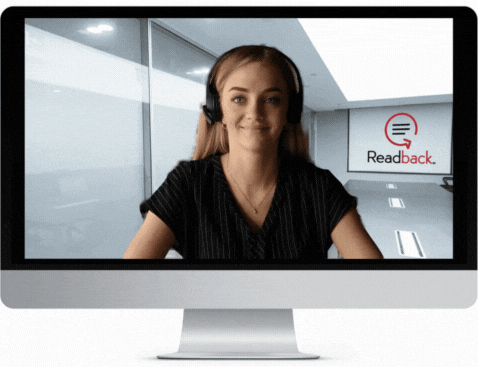The delay in accessing critical information needed to adapt for dynamic decision-making during and after depositions is a problem.
Depositions are demanding. Preparation is intense. In session, many things can go right or wrong so adaptability is essential to optimize outcomes. Does the transcript reflect the exact wording you needed for summary judgement, negotiation, or trial? Are you informed enough to be sure or to ask follow-on, clarifying questions to get sure?
Following the deposition, are you immediately informed to prepare for the next deposition, client communications, or negotiation? Or, will you act without precise clarity and set the file aside requiring an hour to refamiliarize in a couple weeks after receiving the transcript?
How can you possibly get the best outcome for your client when you won’t know the exact transcript wording for weeks?
Now you can dominate your depositions with a reporting partner that mitigates risks to support your best performance. Whether your deposition is to build a roadmap for the case, prepare for summary judgement, or prepare for trial, your client needs the most favorable transcript practical. Get a competitive edge, demonstrate professional competence, and avoid uncertainty by precisely getting the transcript that verifies the wording as only real-time reporting enables. Readback means you can take appropriate actions in hours, not weeks.
Taking Attorneys viewing the transcript during the deposition, at lunch, during a break, or later in the evening can avoid these common missteps:
Get in Touch with Our Team
| Misstep | The Problem | How Readback Helps |
|---|---|---|
| #1 Neglecting Trial Preparation During Depositions | Focusing solely on discovery or summary judgment without preparing for trial risks leaving gaps in your case. | Real-time reporting enables immediate review of testimony, allowing you to refine questions and ensure responses are locked in for trial. |
| #2 Failing to Optimize Question Phrasing for Trial | Without immediate transcript access, attorneys may fail to adjust their question phrasing to use “loaded words” that lock down testimony effectively for trial presentation. | Real-time access lets you adjust phrasing on the fly and re-ask questions to ensure precise and persuasive answers that hold up in court. |
| #3 Missing Errors or Misstatements in Testimony | Failing to catch and correct a witness’s misstatements or inaccuracies during the deposition, leaving errors unchallenged and uncorrected. | Real-time transcription allows you to identify and address errors immediately, avoiding a flawed or incomplete record. |
| #4 Allowing Ambiguous Testimony to Stand | Letting unclear or vague answers remain unchallenged in the record, risking gaps in your case. | Real-time reporting ensures you can catch ambiguities during the deposition and rephrase questions to clarify the record. |
| #5 Overlooking Key Opportunities to Follow Up | Missing critical details in a witness’s testimony, resulting in lost opportunities for crucial follow-up questions. | Real-time review makes it easier to circle back to key points during the deposition while the witness is still present. |
| #6 Missing Inconsistencies in Witness Testimony | Failing to identify and confront contradictions in real time, losing the chance to challenge credibility effectively. | Reviewing real-time transcripts during breaks allows you to identify discrepancies and adjust your strategy for immediate confrontation. |
| #7 Losing Track of Key Testimony | Without real-time transcription, critical points may slip past unnoticed, leaving gaps in your questioning strategy or case preparation. | Access to testimony ensures you stay organized and on top of the record. |
| #8 Inadequate Preparation for Multiple Depositions | Scheduling depositions in close proximity without immediate access to prior transcripts risks losing critical context when witnesses' testimonies overlap. | Real-time transcripts ensure you can review one deposition immediately before the next, allowing you to confront witnesses with conflicting accounts. |
| #9 Relying Too Heavily on Memory or Notes | Depending on hurried notes or memory instead of an accurate transcript, leading to missed details or weaker questioning. | Real-time transcription eliminates reliance on memory, giving you an exact record to refer to during questioning. |
| #10 Losing Control of the Record | Without access to audio recordings alongside the transcript, you risk losing control of the record when a witness attempts to “clarify” their testimony during the review process. | Integrated audio recordings allow you to challenge attempts to alter testimony with errata, providing definitive proof of what was said. |
| #11 Undermining Your Professionalism and Credibility | Giving opposing counsel or clients the impression of being less prepared or technologically adept. | The cutting-edge features of Readback, including instant access, demonstrate professionalism and a commitment to leveraging the best tools for your client. |
Is it Costly?
Not anymore. Just a few short years ago, real-time reporting cost a substantial premium due to the very limited number of stenographers capable of the speed and accuracy required. Today, thanks to A.I. assistance, costs are on par with conventional reporting.
Is it Hard?
To the contrary, real-time reporting augments your preparation and places a safety net under your performance by relieving you of reliance on memory and notes. Also, remember ABA Formal Opinion 477R. This duty of technological competence is critical not only for maintaining professional standards but also for avoiding malpractice risks. Tools like Readback address many of the challenges attorneys face, ensuring compliance with evolving expectations while enhancing the quality of representation.
In all these ways, Active Reporting helps litigators avoid errors, make more strategic and timely decisions, and ensure that they aren’t missing crucial details during a deposition. It effectively adds an additional layer of precision and reliability to the entire process, serving as a safety net to mitigate risks that could otherwise negatively impact the case. All at low flat rates.
![]()
“I love working with Readback. They provide you with value. First, I love that audio recordings are free. These are incredibly helpful for mediations and even trials. Next, getting the transcript in only one day can save you in a pinch. Lastly, the price is right. I somehow get more services for less money. It’s an easy decision to use Readback.”
-Attorney Andrew Lacy
Lacy Employment Law Firm

Service You Can Trust
We are SOC2 certified and meet the highest standards for data security and privacy. Our 100% US-based team ensures accuracy and reliability for your transcript.
Dedicated Live Guardian
Readback provides a live remote Guardian, a highly-trained professional who ensures smooth depositions by administering oaths, handling exhibits, providing tech support, and producing a certified transcript.

